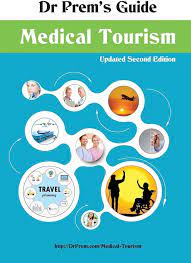
Mastering the Art of Medical Travel Planning: Your Guide to Seamless Healthcare Abroad
Medical Travel Planning: Your Guide to Seamless Healthcare Abroad
In recent years, medical travel has emerged as a viable option for individuals seeking specialized and affordable healthcare solutions. With the advancement of technology and globalization, patients now have the opportunity to access world-class medical treatments in foreign countries. If you are considering medical travel, careful planning is essential to ensure a smooth and successful experience.
Research and Choose the Right Destination
The first step in medical travel planning is researching and selecting the appropriate destination for your specific healthcare needs. Consider factors such as the expertise of healthcare professionals, reputation of hospitals and clinics, language barriers, cultural compatibility, and travel accessibility. Look for destinations known for their excellence in the particular medical treatment you require.
Find Accredited Healthcare Providers
Once you have chosen a destination, it is crucial to identify accredited healthcare providers who specialize in your required treatment. Look for hospitals or clinics that have international accreditations or certifications from recognized organizations. These accreditations ensure that the facilities meet strict quality standards and provide safe and effective care.
Consultation with Medical Professionals
Prior to making any travel arrangements, schedule a consultation with the medical professionals at your chosen healthcare facility. This consultation can be conducted online or over the phone. During this discussion, share your medical history, current condition, and any specific concerns you may have. The medical professionals will evaluate your case and provide guidance on treatment options, expected outcomes, and associated costs.
Budgeting and Financial Planning
Medical travel involves various costs such as treatment fees, travel expenses, accommodation, visas, and post-treatment care. Create a comprehensive budget that includes all these aspects to avoid any financial surprises. Research the average costs of medical procedures in your chosen destination and compare them with your home country to ensure you are making an informed decision.
Travel and Accommodation Arrangements
Once you have finalized the treatment plan, it’s time to make travel and accommodation arrangements. Consider factors such as flight availability, visa requirements, local transportation, and proximity to the healthcare facility. Many medical travel facilitators offer assistance in organizing these logistics, ensuring a hassle-free experience for patients.
Prepare Necessary Documentation
Ensure that you have all the necessary documentation in place before traveling. This includes medical records, prescriptions, insurance documents, identification papers, and any other relevant paperwork. It is advisable to carry both digital and hard copies of these documents for easy access during your medical journey.
Post-Treatment Care and Follow-Up
After your medical procedure is complete, it is essential to follow the post-treatment care instructions provided by your healthcare provider. Discuss with them regarding any follow-up appointments or consultations that may be required after returning home. Stay in touch with your local healthcare professionals as well, so they can monitor your progress.
Enjoy Your Recovery
While medical travel may involve some initial apprehension, remember that you are embarking on a journey towards improved health and well-being. Take this opportunity to explore the culture and attractions of your chosen destination during your recovery period. Engage in activities that promote relaxation and rejuvenation.
In conclusion, careful planning is key when considering medical travel. By conducting thorough research, choosing accredited healthcare providers, budgeting wisely, making necessary arrangements beforehand, and following post-treatment care instructions diligently; you can ensure a seamless and successful medical travel experience. Embrace this opportunity to receive world-class healthcare while exploring new horizons.
8 Essential Tips for Planning Your Medical Travel Abroad
- Research the destination’s healthcare system and facilities.
- Check if you need a visa or any special travel documents.
- Consult with your doctor about your medical condition and travel suitability.
- Ensure you have comprehensive travel insurance that covers medical emergencies.
- Make a list of necessary medications and ensure you have enough supply for the trip.
- Plan for post-treatment recovery, including accommodation and transportation needs.
- Communicate with the healthcare provider abroad to understand treatment options, costs, and logistics.
- Consider language barriers and arrange for translation services if needed.
Research the destination’s healthcare system and facilities.
When planning for medical travel, it is crucial to thoroughly research the destination’s healthcare system and facilities. Understanding the quality of healthcare available, the expertise of medical professionals, and the reputation of hospitals and clinics is essential for making informed decisions. Look for destinations that have a strong track record in providing excellent medical care and have reputable healthcare facilities with international accreditations. By conducting thorough research, you can ensure that you choose a destination that meets your specific healthcare needs and provides a safe and reliable environment for your treatment.
Check if you need a visa or any special travel documents.
When planning your medical travel, it is crucial to check if you require a visa or any special travel documents for your chosen destination. Different countries have varying visa requirements, and it is essential to comply with the immigration regulations of the country you plan to visit. Research the visa application process and ensure that you have ample time to obtain the necessary documentation before your intended departure date. Additionally, some countries may have specific requirements for medical travelers, such as medical visas or letters from healthcare providers. By verifying and fulfilling these requirements ahead of time, you can avoid any last-minute complications and ensure a smooth journey for your medical treatment abroad.
Consult with your doctor about your medical condition and travel suitability.
When planning for medical travel, it is crucial to consult with your primary healthcare provider about your specific medical condition and the suitability of travel. Your doctor possesses valuable knowledge about your health history, ongoing treatments, and any potential risks or precautions associated with traveling for medical purposes. By discussing your plans with your doctor, you can gain important insights, receive personalized advice, and ensure that you are making an informed decision regarding your medical travel. Their expertise will help you navigate through the process and ensure that your health remains the top priority throughout your journey.
Ensure you have comprehensive travel insurance that covers medical emergencies.
When planning for medical travel, it is crucial to prioritize your safety and well-being. One essential tip is to ensure you have comprehensive travel insurance that covers medical emergencies. Medical treatments can be unpredictable, and having the right insurance coverage will provide you with peace of mind and financial protection in case of unexpected complications or emergencies. Make sure your insurance policy includes coverage for medical evacuation, hospital stays, doctor visits, and any necessary follow-up care. By having comprehensive travel insurance in place, you can focus on your health without worrying about the potential financial burden of unforeseen circumstances.
Make a list of necessary medications and ensure you have enough supply for the trip.
When planning for medical travel, it is crucial to make a comprehensive list of all the necessary medications you currently take and ensure that you have an ample supply for the duration of your trip. This includes both prescription medications and any over-the-counter drugs or supplements you rely on. It is advisable to consult with your healthcare provider to determine the appropriate quantity of each medication needed for your journey. By taking this proactive step, you can avoid any potential disruptions in your treatment plan and ensure a smooth and uninterrupted healthcare experience while traveling abroad.
Plan for post-treatment recovery, including accommodation and transportation needs.
When planning for medical travel, it is crucial to consider the post-treatment recovery period and make appropriate arrangements for accommodation and transportation. After undergoing a medical procedure, your body needs time to heal and recuperate. It is essential to choose accommodation that provides a comfortable and supportive environment conducive to your recovery. Consider factors such as proximity to the healthcare facility, accessibility features, and amenities that promote relaxation. Additionally, plan for transportation needs during this period, ensuring easy access to follow-up appointments or any necessary medical care. By proactively addressing these aspects of post-treatment recovery, you can ensure a smoother and more comfortable healing process.
Communicate with the healthcare provider abroad to understand treatment options, costs, and logistics.
When it comes to medical travel planning, one crucial tip is to establish effective communication with the healthcare provider abroad. By reaching out and engaging in clear and open dialogue, you can gain a comprehensive understanding of your treatment options, associated costs, and logistical details. This direct communication allows you to ask any questions or express concerns you may have, ensuring that you are well-informed and prepared for your medical journey. Understanding the treatment options available, discussing financial aspects, and clarifying logistical arrangements will help you make informed decisions and ensure a smooth experience throughout your medical travel journey.
Consider language barriers and arrange for translation services if needed.
When planning for medical travel, it is important to consider potential language barriers that may arise during your healthcare journey. Communication plays a vital role in ensuring effective and safe medical care. If you are traveling to a country where the native language is different from your own, it is advisable to arrange for translation services to bridge any language gaps. This can include hiring interpreters or utilizing translation apps or services. By addressing language barriers proactively, you can ensure clear communication with healthcare professionals, understand medical instructions accurately, and have a more comfortable and informed experience throughout your medical travel journey.


